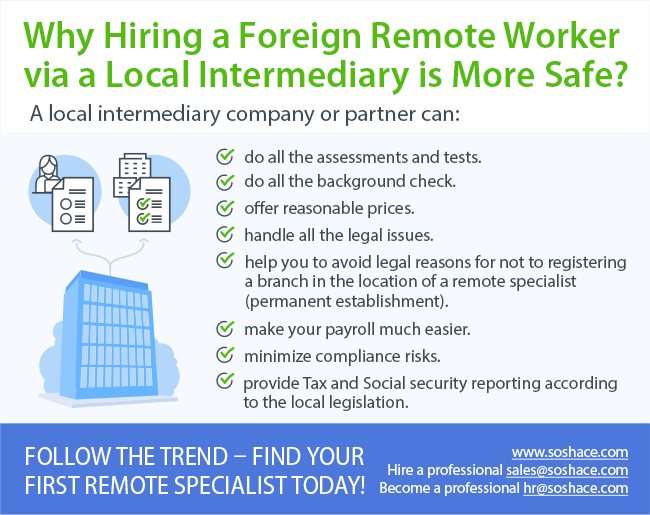How to neutralize the risks of hiring a contractor or a freelancer? In our previous article “How to pay your foreign employees?” we have mentioned that one of the easiest and safest ways of paying your remote employees to do it via a local intermediary.
We explained that in such scheme of cooperation your American company is signing an agreement with a local partner (intermediary), who provides you remote specialists (for example, web developers) on a full-time basis for your project and guarantees the quality of the delivered tasks and meeting the deadlines.
One of the most sought-after professions is a programmer, a web developer, a software engineer or an app developer. Specialists with the coding skills (web developers, coders, programmers, application developers) are in high demand now in any country and never have a problem with finding a job or a project. In addition, all they need for work is a laptop and internet access, that’s why they mainly prefer to work for the companies on a remote basis. Foreign programmers with a good knowledge of English easily compete in price with the American developers. That’s why many U.S. companies prefer to cooperate with the Russian, Chinese or Indian web-developers, than with the American specialists. Even Fortune 500 list brands started to hire remote web developers globally and consider it as a chance for reducing costs, acquiring best talents worldwide and increasing productivity and engagement.
But what is better for your project? To hire a remote worker as an independent contractor or to cooperate with a remote specialist via an intermediary? In our previous article we made analysis of this issue.
Due to this fact we will not describe in details what does an independent contractor mean and only mention that such workers are responsible just for the results of their projects and not the way they are being delivered, as long as their clients (payers) cannot control their internal processes. Independent contractors are usually working just for one company and receive hourly rate pay, but of course they also can work as freelancers.
As long as the only difference between an independent contractor and freelancer (for example, freelance developer) is in a quantity of projects and clients. Freelancers, like independent contractors, are taking their private tax responsibilities on their own, but they are working for several small projects at the same time. Independent contractors usually take just one long-term full time project. Contractors and freelancers don’t get vacation time payments, remuneration for public holidays and pension fund payments.
Cooperation with contractors pros and cons
| Cooperation with contractors pros: | Cooperation with contractors cons: |
| 1) Price
2) Quick and Agile 3) Some contractors are highly skilled and professional 4) Your company can save money on renting an office space for a remote independent contractor
|
1) Impossible to control the process
2) Can only control the final result 3) Hard to identify remote foreign contractor status 4) Wrong independent contractor status identification can cause legal consequences
|
Cooperation with freelancers pros and cons
| Cooperation with freelancers pros: | Cooperation with freelancers cons: |
| 1) Price
2) Can be quick and agile 3) Flexibility 4) Opportunity to outsource small tasks and not hire a full time employee for it 5) You can free up your team for other projects
|
1) Very often they cooperate without a contract
2) They may vanish 3) For building a high quality product you need more than just one freelancer 4) Hard to find a professional and highly-skilled specialist 5) No support and hard to build long-term relationships 6) Hard to guarantee quality 7) Legal issues (see our previous article)
|
To neutrlalize the risks of hiring a freelancer or an independent contractor we recommend to hire a remote specialist via an intermediary (like a remote freelance marketplace Soshace).
Many U.S. companies now hire international specialists as remote independent contractors or via intermediaries for the positions they cannot offer them on a full time basis due to difficulties and high costs of obtaining work permits and visas for them.
Of course, The easiest and the mostly attractive way for your American company to hire a remote employee is to do it via a local intermediary company, which may become your business partner.
Why you would like to work via an intermediary like Soshace?
- We do assessment and tests.
- We do all the background check.
- We offer reasonable prices.
- We handle all the legal issues.
- It helps you to avoid legal reasons for not to registering a branch in the location of a remote specialist (permanent establishment)?
- It makes your Payroll much easier.
- It reduces Compliance issues.
- No need for the Tax and Social security reporting.
Follow the trend – hire your first remote specialist today!








